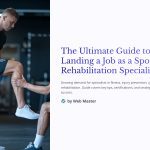 With the growing demand for sports rehabilitation specialists in professional sports, fitness centers, and healthcare facilities, standing out in this competitive field requires strategic career moves. This guide explores key factors that contribute to employment success, including education, certification, networking, and gaining practical experience.
With the growing demand for sports rehabilitation specialists in professional sports, fitness centers, and healthcare facilities, standing out in this competitive field requires strategic career moves. This guide explores key factors that contribute to employment success, including education, certification, networking, and gaining practical experience.

Obtain the Right Education and Certifications
To establish credibility as a sports rehabilitation specialist, obtaining a relevant degree and certifications is essential. Most employers require at least a bachelor’s degree in sports science, physical therapy, or a related field. Some may prefer a master’s degree or additional specialization.
- Key Certifications:
- Certified Strength and Conditioning Specialist (CSCS)
- Certified Athletic Trainer (ATC)
- Physical Therapy (PT) or Doctor of Physical Therapy (DPT)
- CPR and First Aid Certification
Gaining specialized certifications not only improves your resume but also increases your chances of being hired by reputable organizations.
Gain Hands-On Experience Early
Practical experience is crucial for sports rehabilitation specialists, as employers look for candidates who have worked with athletes or patients recovering from injuries.
- Internships at sports clinics or rehabilitation centers can provide real-world exposure.
- Volunteering with local sports teams helps build practical skills and industry connections.
- Working as an assistant trainer under experienced professionals boosts credibility.
The more hands-on experience you accumulate, the more attractive your profile becomes to potential employers.

Build a Strong Professional Network
Networking plays a significant role in landing a desirable position. Engaging with industry professionals and athletes can open doors to job opportunities.
- Join professional associations such as:
- National Athletic Trainers’ Association (NATA)
- American Physical Therapy Association (APTA)
- Attend sports medicine conferences and workshops to connect with potential employers.
- Use LinkedIn to showcase your expertise and engage with industry leaders.
Strong professional relationships can lead to job referrals and exclusive career opportunities.
Stay Updated with Industry Trends
The field of sports rehabilitation is constantly evolving with new techniques, technology, and research. Keeping up with the latest trends is essential.
- Subscribe to journals and magazines like:
- The Journal of Orthopedic & Sports Physical Therapy (JOSPT)
- Strength and Conditioning Journal
- Take online courses on new rehabilitation techniques.
- Attend continuing education workshops to stay ahead of competitors.
Staying informed and continuously improving your skills will make you a valuable asset in the industry.

Develop Strong Communication and Soft Skills
Besides technical knowledge, soft skills play a vital role in succeeding as a sports rehabilitation specialist.
- Empathy and patience help in dealing with injured athletes.
- Effective communication ensures clear instructions and guidance.
- Problem-solving skills are essential for creating personalized rehabilitation programs.
- Collaboration with doctors, coaches, and trainers enhances treatment effectiveness.
Employers value specialists who can not only treat injuries but also communicate effectively with clients and colleagues.


Consider Specialization to Stand Out
Specializing in a specific area can make you more attractive to employers. Some popular specializations include:
- Geriatric rehabilitation for aging athletes
- Neuromuscular therapy for advanced injury recovery
- Sports psychology for mental resilience training
- Biomechanics analysis for injury prevention
A well-defined specialization can set you apart in the job market and allow you to command higher salaries.
Conclusion
Breaking into the field of sports rehabilitation and achieving career success requires a combination of education, hands-on experience, networking, and continuous learning. By obtaining the right certifications, building strong industry connections, and staying updated with the latest advancements, you can increase your chances of landing a rewarding job.
Q&A
Q: What is the best certification for a sports rehabilitation specialist?
A: It depends on your career goals, but CSCS, ATC, and PT certifications are highly regarded in the industry.
Q: How can I gain experience if I am just starting?
A: Look for internships, volunteer with sports teams, or assist experienced trainers to build practical knowledge.
Q: How competitive is the job market for sports rehabilitation specialists?
A: The demand is growing, but competition is high. Specializing and networking can significantly improve job prospects.
*Capturing unauthorized images is prohibited*


